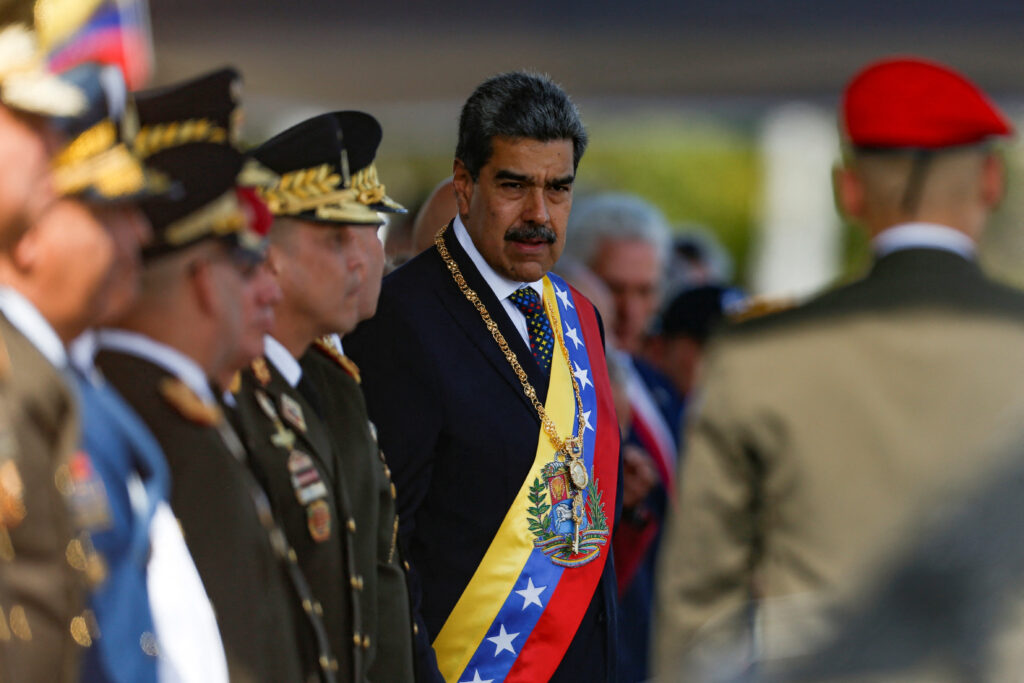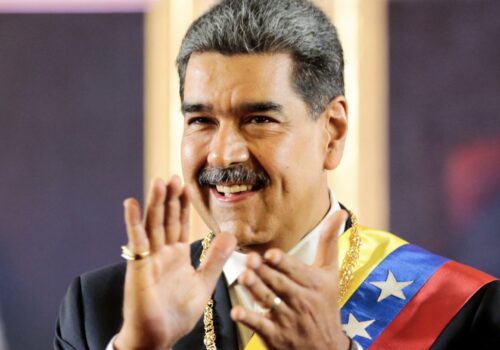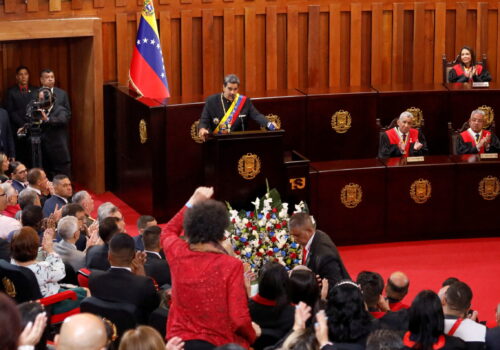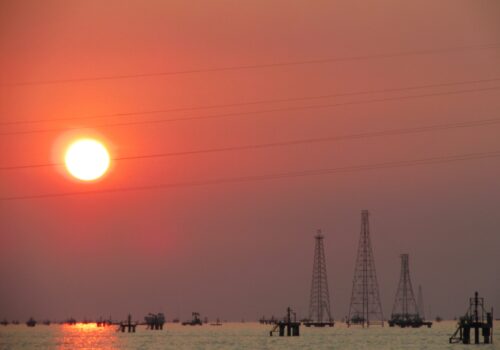JUST IN
He’s tightening his grip. Venezuelan autocrat Nicolás Maduro was inaugurated for a third term as president on Friday despite international observers, including the United States, determining that his victory in last year’s election was fraudulent. Maduro’s swearing-in was accompanied by a new round of US sanctions against Venezuelan officials and comes one day after the government briefly detained opposition politician María Corina Machado. Below, our experts explain what Maduro’s inauguration means for the region, the Venezuelan opposition, and the future of US sanctions policy.
TODAY’S EXPERT REACTION BROUGHT TO YOU BY
- Iria Puyosa (@NSC): Senior research fellow at the Atlantic Council’s Digital Forensic Research Lab
- Jason Marczak (@jmarczak): Vice president and senior director at the Atlantic Council’s Adrienne Arsht Latin America Center
- Geoff Ramsey (@GRamsey_LatAm): Senior fellow at the Adrienne Arsht Latin America Center
What Biden did, and Trump can do
- “The Biden administration has slightly increased pressure” on Maduro’s regime, Iria tells us. While the United States has sanctioned two thousand individuals and raised the bounties on Maduro and his interior minister, Diosdado Cabello, US oil giant Chevron maintains its license to operate in Venezuela. “The new sanctions are insufficient to remove Maduro and Cabello from power,” she argues.
- After it takes office in ten days, the Trump administration should work with regional governments, says Jason, to “accelerate diplomatic coordination to give new momentum to the opposition and to make life harder for Maduro and his accomplices.”
- Despite the regime’s escalating crackdown on the opposition, “it is easy to overstate how strong Maduro really is,” Geoff argues. He points to Maduro’s post-election cabinet reshuffle to empower hardliners, coupled with the elevation of Cabello, a longtime rival, as “a sign of just how few friends Maduro has left.”
- Geoff advises the incoming Trump administration to take note of internal divisions in the Maduro regime that can be further undermined by economic pressure. “Sanctions alone are unlikely to unseat Maduro,” he says, “unless they are accompanied by a clear roadmap to lift them, giving fence-sitting regime figures a blueprint to follow.”
Regional rejection
- Maduro has brought Latin American leaders “from across the political spectrum together to reject his new power grab,” Jason tells us. Chilean President Gabriel Boric, Argentinian President Javier Milei, and Panamanian President José Raúl Mulino, he notes, have all rejected Maduro’s claim to victory in last year’s presidential election.
- The highest-ranking foreign official at Maduro’s inauguration, Jason points out, may have been the speaker of Russia’s Duma.
- “The continued large-scale regional rejection of Maduro is no small feat,” Jason says, given Latin America’s historical divisions. “But the critical question,” he adds, “is how to avoid complacency and leverage this unity to further support the democratic opposition.”
A mobilized opposition
- Amid Maduro’s third inauguration, “Venezuelans are again taking to the streets in large numbers, demanding a transition to democracy and the inauguration of González,” says Iria. The Biden administration should use this opportunity to take more “meaningful action” against Maduro, she argues, as “the opposition is now strategically united, the people are mobilized, and the ruling coalition is showing cracks.”
- Regional governments working to pressure Maduro, Jason says, should also strive to “avoid burdening the Venezuelan people with more hardships.” Pressuring Maduro’s government while sparing the Venezuelan people from the worst effects of sanctions is “a delicate tightrope to walk” Jason adds, but is “necessary to give further hope to the overwhelming number of Venezuelans who cast a vote for democracy and freedom in July.”
Further reading
Fri, Jan 10, 2025
Experts react: What does Maduro’s third-term power grab mean for Venezuela’s future?
New Atlanticist By
Strongman Nicolás Maduro was sworn in for a third six-year presidential term on January 10, six months after a stolen election.
Wed, Jan 8, 2025
Recalibrating the use of individual sanctions in Venezuela
Issue Brief By Geoff Ramsey, Lucie Kneip
As Maduro consolidates power in Venezuela, who has the United States sanctioned—and are those sanctions working?
Tue, Dec 3, 2024
There’s a more effective way forward than “maximum pressure” for Venezuela
EnergySource By
Following the fraudulent outcome of Venezuela's July election, there is growing pressure on the United States to reintroduce sanctions to expel Western firms from the nation’s oil sector. However, preserving the existing policy, which restricts the regime’s financial access while promoting energy security and countering foreign influence, might prove more effective.
Image: President Nicolas Maduro attends, on the day of his inauguration for a third six-year term, at a military academy in Caracas, Venezuela January 10, 2025. REUTERS/Leonardo Fernandez Viloria.



